PARTI Item1. Business business in countries or with persons and entities included on designated country or person lists promulgated by the U.S. Department of the Treasurys Office of Foreign Assets Controls and equivalent authorities in other countries. Our AML and sanctions compliance programs, overseen by our AML/Bank Secrecy Act Officer, are composed of policies, procedures, and internal controls, and are designed to address these legal and regulatory requirements and assist in managing money launderingandterroristfinancingrisks. InterchangeFees Interchange fees associated with four-party payments systems are being reviewed or challenged in various jurisdictions. For example, in the EU, the Multilateral Interchange Fee Regulation caps interchange fees for credit and debit card payments and provides for business rules to be complied with by any company dealing with payment card transactions, including PayPal. As a result, the fees that we collect in certain jurisdictions may become the subject of regulatory challenge. ANNU DataProtectionandPrivacy AL Weare subject to a number of laws, rules, directives, and regulations (“privacy and data protection laws”) relating to the REPOR collection, use, retention, security, processing, and transfer (collectively, “processing”) of personally identifiable information about our customers, our merchants customers, and employees (“personal data”) in the countries where we operate. Our T businessrelies on the processingof personal data in many jurisdictions and the movement of data across national borders. As a result, much of the personal data that we process, which may include certain financial information associated with individuals, is subject to one or more privacy and data protection laws in one or more jurisdictions. In many cases, these laws apply not only to third-party transactions, but also to transfers of information between or among us, our subsidiaries, andotherpartieswithwhichwehavecommercialrelationships. Regulatory scrutiny of privacy, data protection, cybersecurity practices, and the processing of personal data is increasing around the world. Regulatory authorities are continuously considering numerous legislative and regulatory proposals and interpretive guidelines that may contain additional privacy and data protection obligations. Many jurisdictions in which we operate have adopted, or are in the process of adopting, or amending data privacy legislation or regulation aimed at creating and enhancing individual privacy rights. In addition, the interpretation and application of these privacy and data protection laws in the U.S., Europe, and elsewhere are subject to change and may subject us to increased regulatory scrutiny and businesscosts. Anti-corruption PayPal is subject to applicable anti-corruption laws, such as the U.S. Foreign Corrupt Practices Act and the U.K. Bribery Act, andsimilar laws in the jurisdictions in which we operate. Anti-corruption laws generally prohibit offering, promising, giving, accepting, or authorizing others to provide anything of value, either directly or indirectly, to or from a government official or private party in order to influence official action or otherwise gain an unfair business advantage, such as to obtain or retain business. We have implemented policies, procedures, and internal controls that are designed to comply with these laws andregulations. AdditionalRegulatoryDevelopments Various regulatory agencies continue to examine and implement laws governing a wide variety of issues, including virtual currencies, identity theft, account management guidelines, disclosure rules, cybersecurity, competition, and marketing, which may impact PayPals business. Certain governments around the world are adopting laws and regulations pertaining to ESG performance, transparency, and reporting, including those related to general corporate ESG disclosures (e.g., the EU Corporate Sustainability Reporting Directive) as well as topical reporting and risk management requirements, such as obligationsrelatedto the managementofclimate-relatedrisks. For an additional discussion on governmental regulation affecting our business, please see “Item 1A. Risk Factors” and “Item3.LegalProceedings”includedinthisForm10-K. HumanCapital At PayPal, we consider the management of our global talent (human capital) to be essential to the ongoing success of our business. As of December31, 2022, we employedapproximately29,900peopleglobally,with44% in theAmericas,43% in Asia-Pacific, and 13% in Europe and the Middle East. Our global employees work predominantly full-time and represent nearly 150 nationalities, across 27 countries, including approximately11,800 located in the U.S. •2022AnnualReport 11
 2023 Annual Report Page 158 Page 160
2023 Annual Report Page 158 Page 160